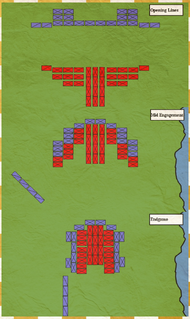|
Welcome |
|
From the early beginnings of civilisation to contemporary times, the Brief History of the World Wiki offers a magisterial sweep through time and history. Although Eurocentric terms like the "Middle Ages" are used, it is intended as "world" history. Such artificial historical divisions are still useful to help keep the past manageable; after-all it really is just the one long narrative, drifting seamlessly from one brief form to the next. |
|
Explore History |
|
Featured Article |
 Battle of Cannae (August 216 BC) Hannibal’s victory over the Romans at the Battle of Cannae (2 August 216 BC) during the Second Punic War is often cited as one of the greatest examples of generalship in history. Hannibal had already done the unthinkable, marching his army from Spain through hostile southern Gaul, and over the Alps into Italy, before defeating the Romans heavily at Trebia (December 218 BC) and Lake Trasimene (June 217 BC). Although some like Quintus Fabius Maximus urged caution, the Roman Senate insisted they could prevail at Cannae through sheer weight of numbers; 85,000 Romans compared to 50,000 Carthaginians. One a section in which Hannibal outnumbered the Romans was cavalry, and, to mitigate this, the Roman strategy was to concentrate their infantry in the centre. Meanwhile Hannibal’s strategy was almost the opposite, with his light infantry in the centre, and elite heavy infantry on the wings. When the battle joined, the Carthaginian centre yielded slowly to the Roman assault, thus a crescent was formed by the Carthaginian heavy infantry on the wings. At this same time, the Carthaginian cavalry charged the Roman cavalry on the extreme wings, and drove them from the field, opening a breach in the Roman rear. Now Hannibal signalled for the trap to close. Carthaginian cavalry fell upon the Roman infantry from behind, the heavy infantry squeezed from the flanks, and the light infantry fully engaged from the front. The Romans were now fighting in all directions and lost all cohesion. It was a massacre, that left 47,000 dead and 20,000 captured. Hannibal's tactics were a classic case using a double pincer to enveloping an enemy. It was one of the darkest days in Roman history, yet extraordinarily Rome not only survived, but won the Second Punic War, through the exploits of their own military rock star, Scipio Africanus. |
|
Featured Innovation |
|
Humans must frequently have discovered, in a series of happy accidents, the pleasant side-effects of drinking the fermented juice of grape or grain. As early as 7000 BC, jars from the neolithic village Jiahu in Ancient China revealed traces of alcohol; a fermented drink made of grapes, hawthorn berries, honey, and rice. The earliest evidence of the systematic production of alcohol come from Sumeria in Mesopotamia, where by the 4th millennium BC beer was being brewed from barley on a regular basis. Beer subsequently became the national drink of Ancient Egypt, and from there the secrets of brewing spread round the Mediterranean. There is evidence that labourers on the Egyptian pyramids were given a daily stipend of beer. As far away as Ancient Mexico evidence of alcoholic beverages has been found, dating from 2000 BC. |
|
Featured Historical Figue |
 A bust of Socrates in the Louvre. Athens, the first known democratic state in the world, has long been held up as our idealisation of democracy, the ancestors of the British House of Commons, the American Congress, and parliaments around the world. Yet Athenian democracy could also have its dark-side, the terrifying potential to descend into mob-rule and turn on any citizen, even its greatest philosopher. Socrates was one of the leaders of a revolution, a revolution in thinking that had been gathering strength across the Greek world. His passion was applying reason and logic to the study people, to question the society he lived in, and to arrive at political and ethical truths. He was the first fanatically urban individual. For Socrates, Athens was a classroom and he spending his days talking and debating with anyone he met, and gathering around him a group of young students, including Plato. What was paramount for Socrates was that every decision must be made based on thinking for yourself. Yet, Socrates lived in troubled times, in the wake of the death of the great statesman Pericles, when self-interested demagogues vied for power, and in the midst of the Peloponnesian War (431-404 BC) against Sparta and her allies. When the war ended in humiliation and defeat in 404 BC, the Athenians searched for someone to take the blame, they searched for Socrates. He was arrested on charges of corrupting the youth of the city, by questioning Athenian traditions. In his trial, Socrates defiantly defended the ideals by which he had lived his life, and when he was sentenced to death it could hardly have been a surprise. He died in his cell by self-administered poison hemlock. But the accounts of his final days would become some of the most famous Greek writings, and through them he showed his fellow citizens that the principles of reason, of questioning the world, were something worth dying for. |
|
Featured Quotes | ||||||||||||||||||
| ||||||||||||||||||









































































